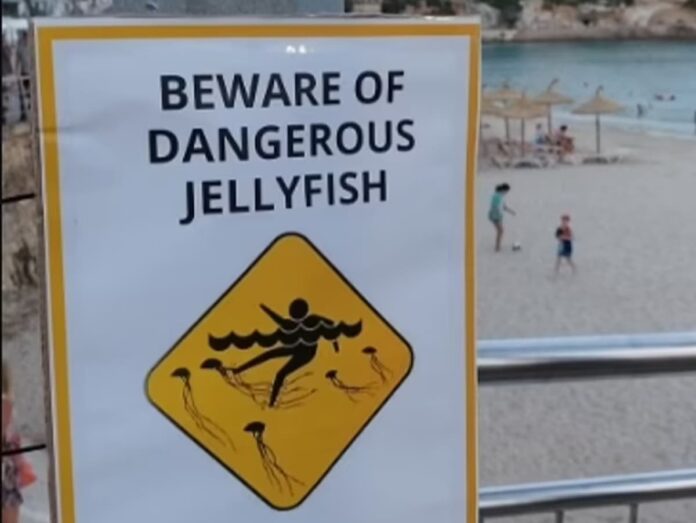For free real time breaking news alerts sent straight to your inbox sign up to our breaking news emails Please enter a valid email address Please enter a valid email address SIGN UP I would like to be emailed about offers, events and updates from The Independent. Read our privacy notice Thanks for signing up to the Breaking News email {{ #verifyErrors }} {{ message }} {{ /verifyErrors }} {{ ^verifyErrors }} Something went wrong. Please try again later {{ /verifyErrors }} Fake signs warning of falling rocks and jellyfish are being put up in Mallorca in a bid to keep British tourists off beaches in the popular holiday hotspot. Alert posters have been put up across the island but include small print in Catalan saying they are not real. ‘Open beach. Not to jellyfish nor foreigners,’ says one. Another in Cala Murta, northwest Mallorca, reads: ‘Come in. The danger is not of a landslide, it is of overcrowding.’ One sign warns of falling rocks on beach (Caterva) Another bogus sign says that bays are closed to the public or that it takes two hours and 53 minutes to walk to a beach that is in fact just about 100 yards away. The signs were put up by the anti-capitalist activist group Caterva, which hit out at tennis star Rafael Nadal for opening a tourism business and restaurant on the island. The group said in a statement: ‘Capitalism uses tourism to the extreme to dry out the territory and extract the maximum surplus value from workers. ‘There are culprits and it is necessary to name them, such as the hoteliers or the Rafael Nadals who are as complicit as the Balearic government.’ Another warns of a nearly 3 hour walk to a beach just 100 yards away (Caterva) Located in the western Mediterranean Sea, Mallorca is the largest of Spain’s Balearic Islands and has a local population of about 876,000, about half of whom live in the capital, Palma de Mallorca. Tourism accounts for some 75 per cent of the island’s total economic output. In 2016 about 14 million people visited the island, with German and English tourists making up the bulk of the numbers at 23 per cent and 22 per cent respectively. Last month travellers heading to the popular island were warned of extremely warm conditions as a heatwave gripped vast swathes of southern Europe. Holidaymakers were warned of ‘extreme risk’ in certain parts of the island after temperatures hit 44.8C in Llubi, just north of the Balearic Island’s centre, on 18 July, with a thermal sensation of 48C. Growing mass tourism and the associated increase in demand for water have repeatedly led to water shortages in the past.
Spanairds put up fake signs warning of falling rocks and jellyfish to deter British tourists
Sourceindependent.co.uk
RELATED ARTICLES


